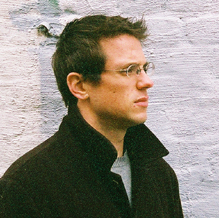 Thursday, April 07, 2005
Thursday, April 07, 2005
Crossing (back) over
For some, being dubbed a crossover artist might carry just as much baggage as being branded a sellout. And whether she likes it or not, British harpist Catrin Finch bears that burden. How could she not be considered a crossover artist after performing on television with Bryn Terfel and recording arrangements of pop tunes for Sony? But unlike other artists who've done similar things, Ms. Finch can still win praise from critics and other harpists (at least that's what I gather after reading Anne Midgette's review of her YCA debut concert at Weill Recital Hall).
Crossing over isn't that uncommon--Yo-Yo Ma has several such albums; the double-bassist Edgar Meyer has a new CD with Bèla Fleck; the flutist James Galway plays the penny-whistle; the pianist Jean-Yves Thibaudet has an Ellington album as well as a CD of tunes by jazz pianist Bill Evans; and the soprano Dawn Upshaw routinely sings songs that aren't in German or French or Italian.
So why do I bring this up? Reading Helen Radice's comments about Ms. Finch--she acknowledges both the respect and jealousy harpists feel towards her--got me thinking about the issue on my own instrument. The saxophone is a versatile instrument and is comfortable in many different musical settings. It's not uncommon to find a saxophonist who plays concert music (yes, there are people that do that sort of thing) as well as jazz or experimental improvisation or salsa, and so on. Well, there is a kind of crossover that happens sometimes in the saxophone world that really ruffles some feathers--the jazz artist who gets a big gig playing a standard saxophone concerto with a world famous orchestra. If you haven't guessed yet, I'm talking about the saxophonist that saxophonists love to hate (no, not Kenny G): Branford Marsalis.
Last December Branford played Glazounov's saxophone concerto with the Chicago Symphony Orchestra conducted by Andrey Boreyko. Branford's no stranger to the concert saxophone world, having cut two CDs of classical music--Romances, a potpourri of short works; and most recently Creation, which includes Milhaud's Scaramouche and La Creation du monde, as well as Jacques Ibert's Concertino da Camera, all recorded with the Orpheus Chamber Ensemble as his back-up band. To some, this was an outrage--"Hey! That's our music!"--while others embraced him as a player who was helping the concert saxophone's cause by bringing repertoire to a wider audience, even if he is a jazz artist. The discussion over at the North American Saxophone Alliance (yes, go ahead and make your jokes, it's NASA), got pretty passionate over the issue.
So what's the big deal? Contrary to popular belief not all saxophonists play jazz. There's a sizeable portion of the saxophone community that plays concert music--and only concert music. As a result, some folks get a bit territorial when an "outsider" plays on their turf. It's understandable. A jazz saxophonist would probably snicker if a concert saxophonist (not one who also plays jazz) booked a gig at the Blue Note and attempted to play changes. But concert saxophonists--some of them--weren't snickering at Branford on stage with the CSO, they were fuming.
Where do I come down w/r/t this issue? Well, I see it from both angles. The CSO wants to sell tickets and Branford is a big-name saxophonist. (The question would be, why would they program the Glazounov concerto anyway?) Yet Branford brings a different set of values to saxophone tone, technique, and interpretation than most concert saxophonists. And there's absolutely nothing wrong with that. However, at this point in the instrument's history, I believe that concert saxophone playing stands as a viable--albeit, less lucrative or recognized--mode of music making vis-à-vis jazz.
Catrin Finch can cross over because she's able to cross back over and not lose any of her musical intergrity in the process. And her crossover stuff displays the same stunning playing that she brings to the concert hall. Ok, so what do I think? Here it is: Not all classical saxophonists can play jazz. And not all jazz saxophonists can play classical.
posted by Brian Sacawa
1:51 AM
|
|
 Praised by The New York Times as "an inventive musician . . . fresh and surprising," saxophonist Brian Sacawa has firmly established himself as an important contemporary voice for his instrument. He is active as a soloist, recitalist, and chamber musician throughout the United States and is the co-founder of the new music duo Non-Zero with percussionist Timothy Feeney.
Praised by The New York Times as "an inventive musician . . . fresh and surprising," saxophonist Brian Sacawa has firmly established himself as an important contemporary voice for his instrument. He is active as a soloist, recitalist, and chamber musician throughout the United States and is the co-founder of the new music duo Non-Zero with percussionist Timothy Feeney.
He has given premieres of over thirty works by both established and emerging composers, including Michael Gordon, Bright Sheng, Andrew Mead, Oliver Schneller, Ken Ueno, Beata Moon, Hillary Zipper, and Scott McAllister, among many others. Named the Baltimore CITYPAPER’s Critic’s Choice for Classical Music in 2002, he is the recipient of awards for solo performance from both national and international competitions.
Sacawa's versatile career has led to appearances with the St. Petersburg Philharmonic, the Detroit Symphony Orchestra, the New World Symphony, Harvard Group for New Music, New Music Brandeis, Bargemusic, and at meetings of the ISU Contemporary Music Festival, World Saxophone Congress, North American Saxophone Alliance, and New England Saxophone Symposium.
Brian holds degrees from the University of Michigan, the Peabody Conservatory, and the University of Massachusetts – Amherst, where he studied with Donald Sinta, Gary Louie, and Lynn Klock. He has recorded for the Equililbrium, Naxos, and BiBimBop recording labels.
See Brian's other blog
Sounds Like Now
| |



